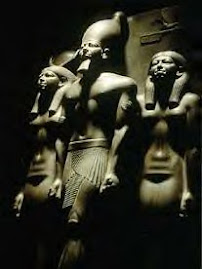Ban the Video Ho!
Shem Hotep ("I go in peace").
Check out the J-Shin Video, this is so unreal. Where can we go from here? Cut and paste this link www.southbeat.com/stream_jshin_video.htm
Ban The Video Ho.
What Would Our Ancestors Think?
What do Jay-Z, Mystical, The Cash Money Crew and Ludicrous have in common besides the bling-bling they wear and the millions of albums they've sold? They all feature women in videos, barely dressed and mostly Black, baring their breasts and backsides in front of the roving eye of the hip hop video camera worldwide for all to see.
Call me a hater, but I am disgusted with the images of women in the majority of hip hop videos today. Sex sells the way my foremothers and fathers were sold during slavery. Must we continue to be slaves to an industry that seems only to appreciate and condone the disabling images of women seen in videos today? Lap dancing, clad in the "thong-the-thong-thong-thong" and "shaking it fast", women of today's hip hop videos are shown in flashes of body parts, without a personality or intellect to match.
From the looks of these videos the rap artists seem to have no concern that our impressionable youth are viewing and imitating much of the images and behavior seen in them. The other day, as I was leaving a store in my Brooklyn neighborhood, a boy no older than eight years old, said to me, "Damn Miss, you got a fat a*s!" I was angry and wondered what influenced him to speak to me, an adult, like this?
The over-exaggerated focus on the use of women as objects purely to satisfy the hip hop male artist's insatiable sexual appetite, only helps to perpetuate societal stereotypes that Black women are ho's and prostitutes and Black men are sexually aggressive pseudo-pimps. Our rap videos have now elevated (or rather plummeted) to the level of R-rated. What happened to the days when hip hop was fun and "PG" rated? When L.L. Cool J crooned "I Need Love". When rappers like Kwame and Kid N' Play merged energetic dance moves and unique fashions with story lines about the honey they were trying to get with? And what about Will Smith's "Summertime" video and Chubb Rock's "Just the Two of Us", when folks were shown at outdoor gatherings, bar-b-queuing, dancing and just having a good time?
I miss those days of hip hop when women seemed to be portrayed more equally in videos and were the object of the rap artist's love desires as opposed to misogynistic ones. Back then, rappers talked about falling in love, not loving 'em and leaving 'em. There's no balance in today's hip hop videos. For every image of a female freak and ho shown, there should be other images of feeling, thinking women who are well-rounded.
The rappers in these videos who are telling us they have "ho's in different area codes" and that women "have to know how to work nice hips" in order to be down are missing the point. It shouldn't just be all about making the dollars and proving who has the finest women. It should also be about integrity, love for community and care for the images of the people who have helped to put these rap artists on their international maps of super-stardom. I am as much a supporter of hip hop as anyone else. I just hope that our rap artists will begin to look at the negative impacts of degrading images of women in their videos and realize hip hop can still be powerful and lucrative without all the bare booty stuff.
So there I sat, painfully absorbing another music video, in all its crass-talking, crotch-grabbing, and ‘bling-bling’-ing glory, as it thundered across the TV screen in brilliant Technicolor. Since I’m partial to the less inane, more socially-uplifting genre of hip-hop music, I shrugged off my distaste as mere stylistic differences. I know, call me conservative. Somewhere, our ancestors were weeping.
For there was a time in this country, when immensely talented African-American artists such as Paul Robeson, Marian Anderson, and Rex Ingram, were denied the opportunity to step on a stage and perform. These pioneers and way-makers struggled through careers of brutal mistreatment, indignities, and humiliation - to secure our basic human right of self-expression. And yes, there was a time when the hip-hop community, often vilified and dismissed as a passing phenomenon, strived for society at large to acknowledge and respect this significant, cultural movement. A movement created by Black and Latino youth, ironically, as a constructive alternative to street brawls and senseless violence. Then, in the midst of honoring our own, we present such a demeaning, sloppy display. Clearly, there have been better days. If only the cameras had been there to record them. Hip-hop has certainly made its gains. Yet, with privilege comes responsibility.
So, after days of judicious contemplation, I feel confident enough to say:
If this is what’s to come - let us go no further. Let us study, learn, and re-evaluate. Let us pay homage to our ancestors, who struggled so valiantly for our benefit. Let us apologize, and ask their forgiveness. The hip-hop community would like to do its part, by upholding the rich, celebrated legacy it has inherited: Please, ancestors; we ask for another chance.
Thanks for reading Ban the Video Ho. What Would Our Ancestors Think? I Hope you were able to find something here to hang on to. Hotep, Your Brother.












No comments:
Post a Comment